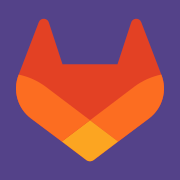Michi, Limited Edition - 4 years all-remote at GitLab
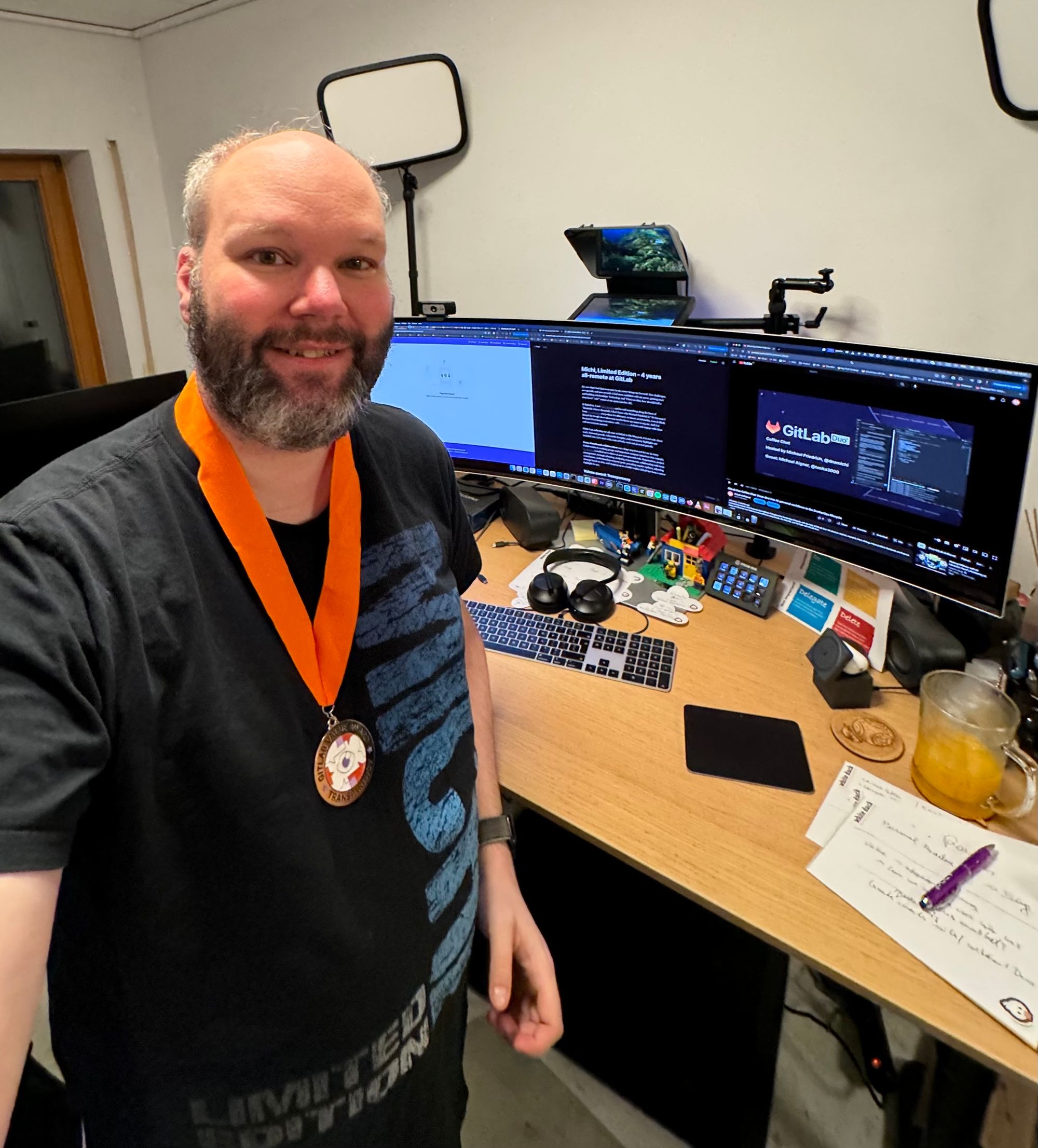
It is rare that I feel that every year in my career brings me forward. 4 years in a row now at GitLab. New challenges, new growth, and new rewards. I feel more confident with my peers, gaining trust and building relationships. Technology and "I have no idea, how should I tell a story here? *sob*" comes at me again (spoiler: I now know thanks to the AI stories in this blog post).
While I am reflecting on my 4th year at GitLab in this blog post, it is not only about work. Personal growth, vulnerable thoughts, and community highlights are included, too.
At KubeCon, I met Matt Genelin, and he said something along the lines of "dnsmichi. I know dnsmichi. I don't know who Michael Friedrich is ;-)" It's because I keep my nickname everywhere for efficiency, in issues, social media, even in Slack. Except for Google docs where you need to know my name to tag me. And it is because I love being everywhere, with short toes, to learn and engage with ideas and see everyone succeed.
Cross-functional collaboration was a huge step forward for me in 2023. Collaboration in working groups and important company initiatives (for example, CI adoption) enabled me to thrive at new unexpected levels. Organization, project management, strategic planning, analyzing requirements, collaborating with team contributors, understanding company goals, providing regular updates, adjusting strategy based on data, and stepping up as a leader within GitLab has been a career highlight for me.
Values award: Transparency
While I am engaged in initiatives, I often put my users hat on when changes are discussed. How would I receive this change or limit? Are there (technical) blockers that we should address before moving forward with plans? Everything needs to be documented, we need tutorials, example code for automation, and help customers and users get more efficient. If things break, I'm not shy to step up and propose a path forward together.
For example, repository mirroring was not available anymore to free users on GitLab.com. It was used as a workaround to sync forks with upstream repositories, enabling open-source contributions. Together, we discussed, iterated, designed, and made it happen to implement a long awaited UI feature, syncing forks with just one click.
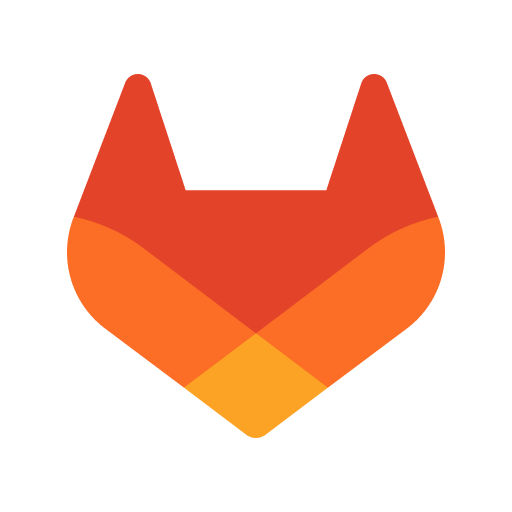
My favorite transparency sub-value is Say why, not just what. Provide a reason why we are doing this change, even if it might inspire negative feedback. Because feedback is a gift (thank you for making me embrace this, Emilio Salvador), and feedback through transparency works best when it hurts. I'm also a fan of public discussions. In Slack, I often encourage discussions in private DMs moved into public channels to enable more efficient collaboration, and ensure everyone can contribute. When assuming positive intent, every conversation leads to ideas, actions and feedback. Not everything can be public by default. The SAFE framework helps me in situations where I want to push for transparency, but then take a step back and re-evaluate.
The Transparency Award honors my passion. This is truly special, because team members nominated me. I am forever grateful. 💜
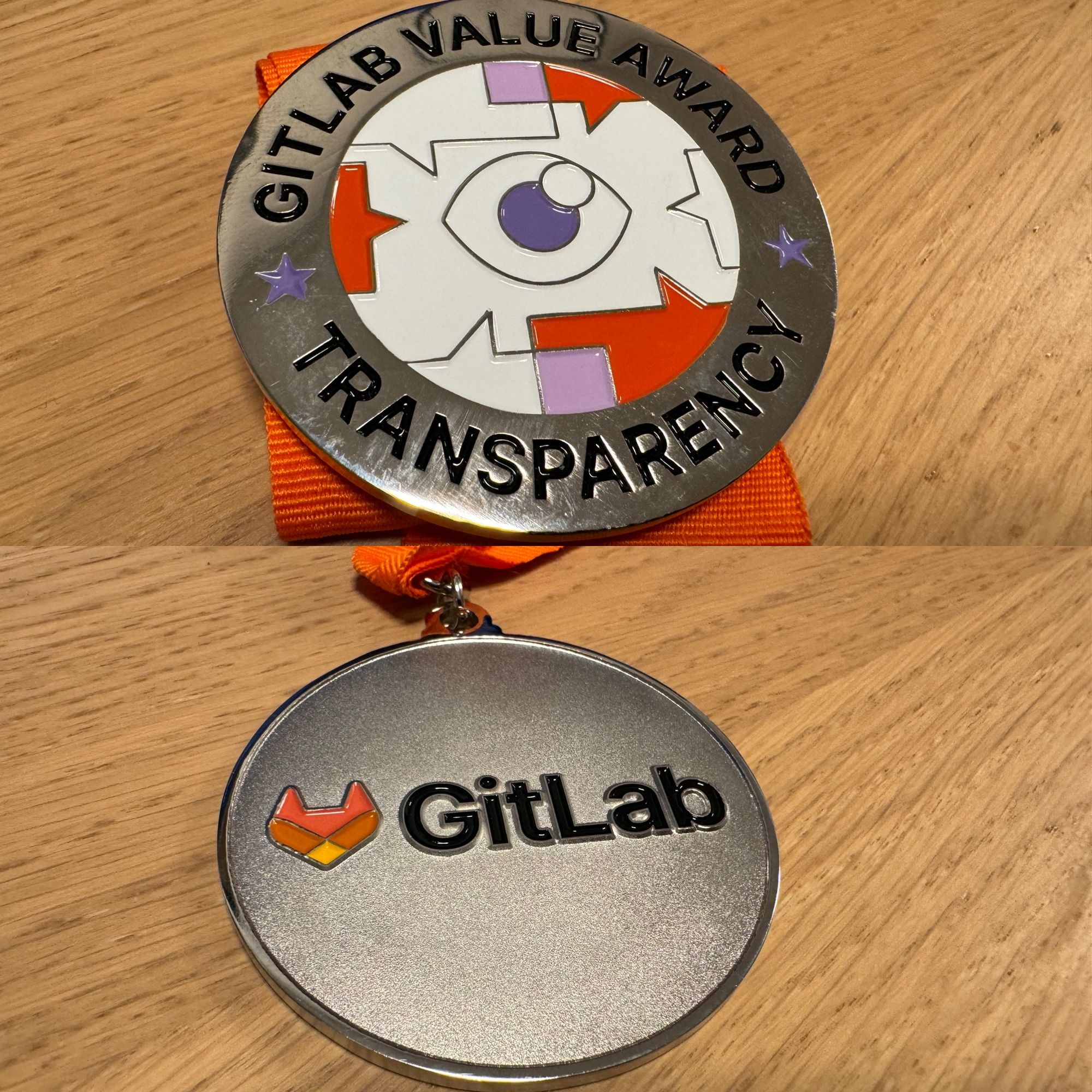
Personal connections in an all-remote environment
I still explain to new folks that my Zoom calls feel like we are sitting in the same room together, albeit sometimes thousands of kilometers/miles away. During the pandemic, team offsites and events were not possible. I was fortunate to travel and speak at events in 2022, and continued to meet team members in 2023.
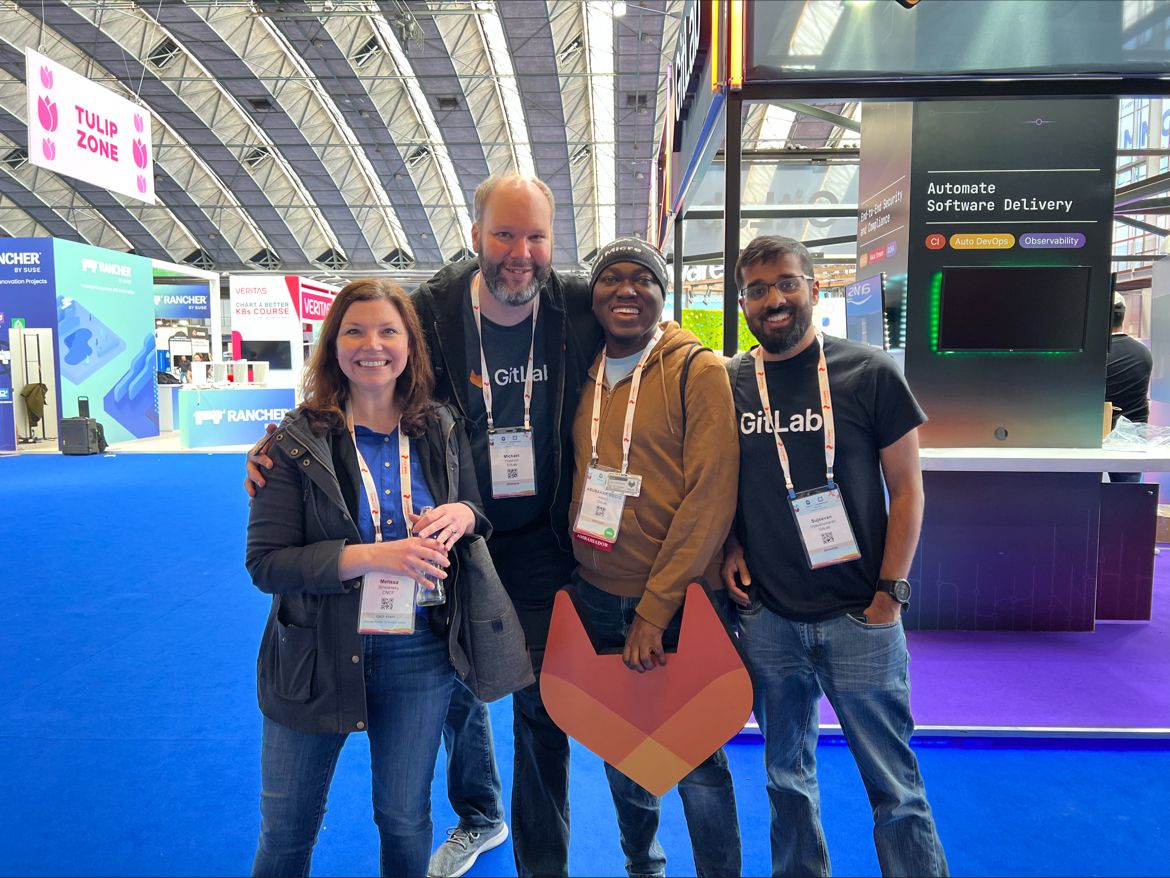
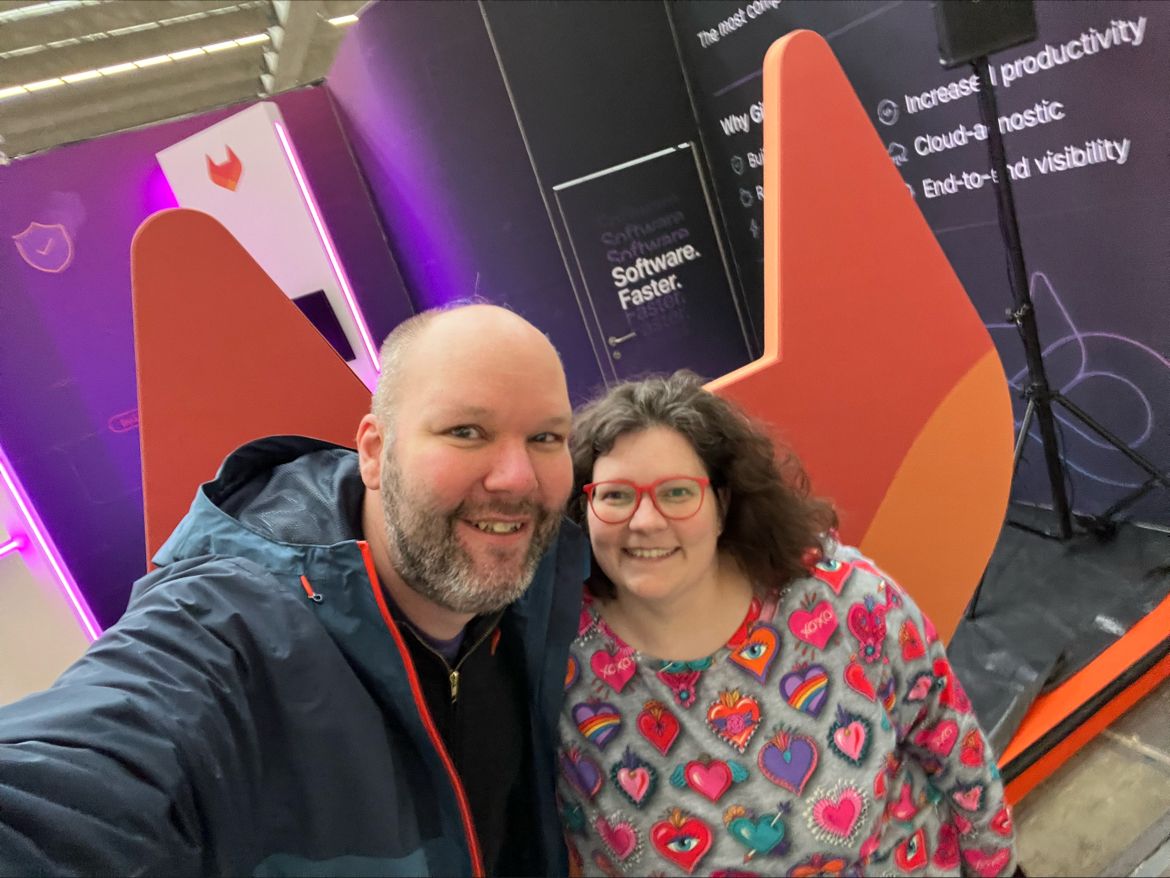
And then - the Developer Relations team offsite in London. A mix of workshop and strategy sessions, with a city detective game to solve puzzles together as a team. Certainly, a fun teasing competition across three teams, which allowed me to learn more about each one of us. And a lovely team dinners, spending quality time together. Did you know that I am 6.5ft/2m tall? Certainly, everyone now does, including Emilio Salvador and Ashley Kramer :-)
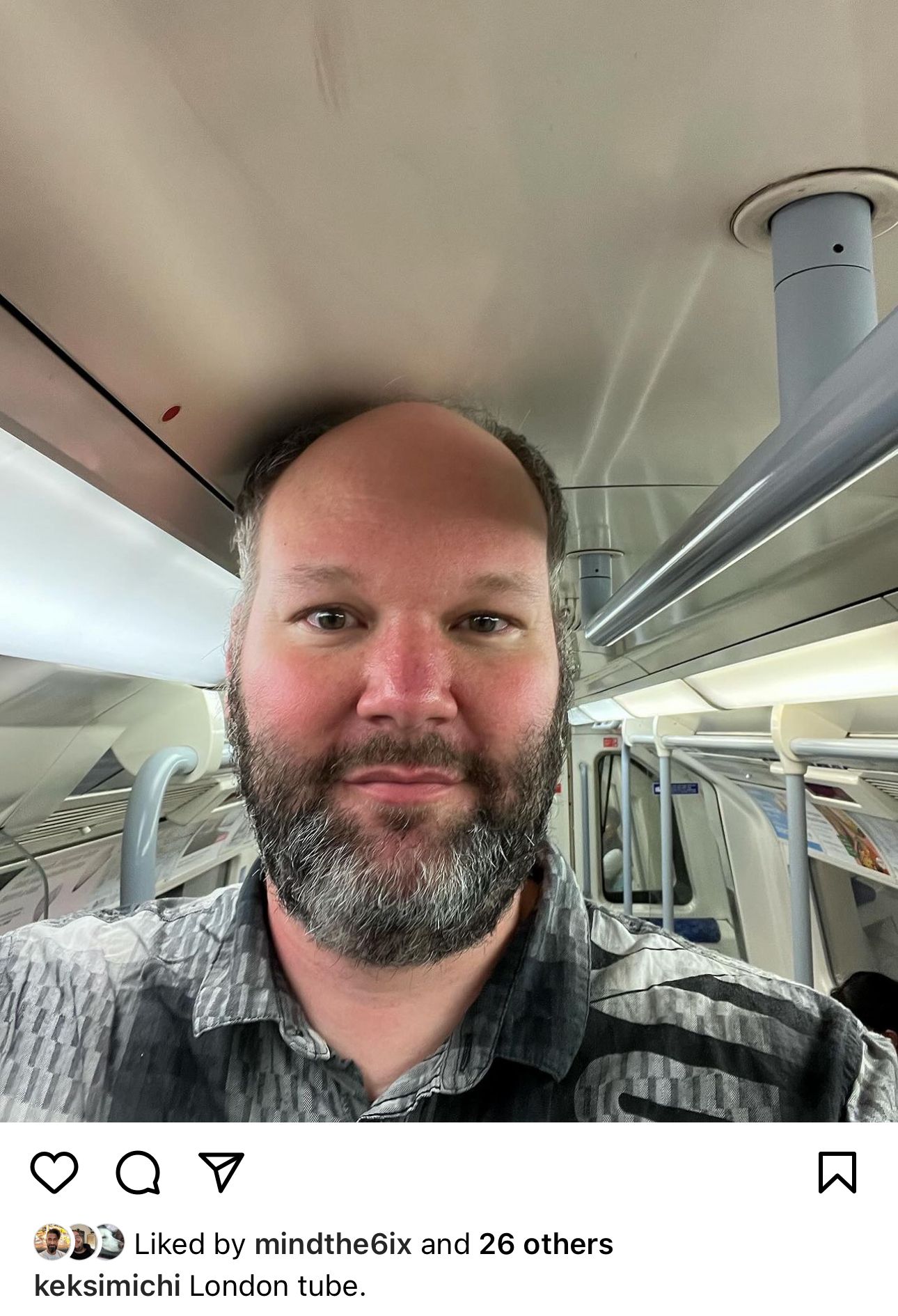
Chicago was one of my other personal highlights this year, because Mark Nuzzo took us on a city tour, deep dish pizza and many stories and laughter included.
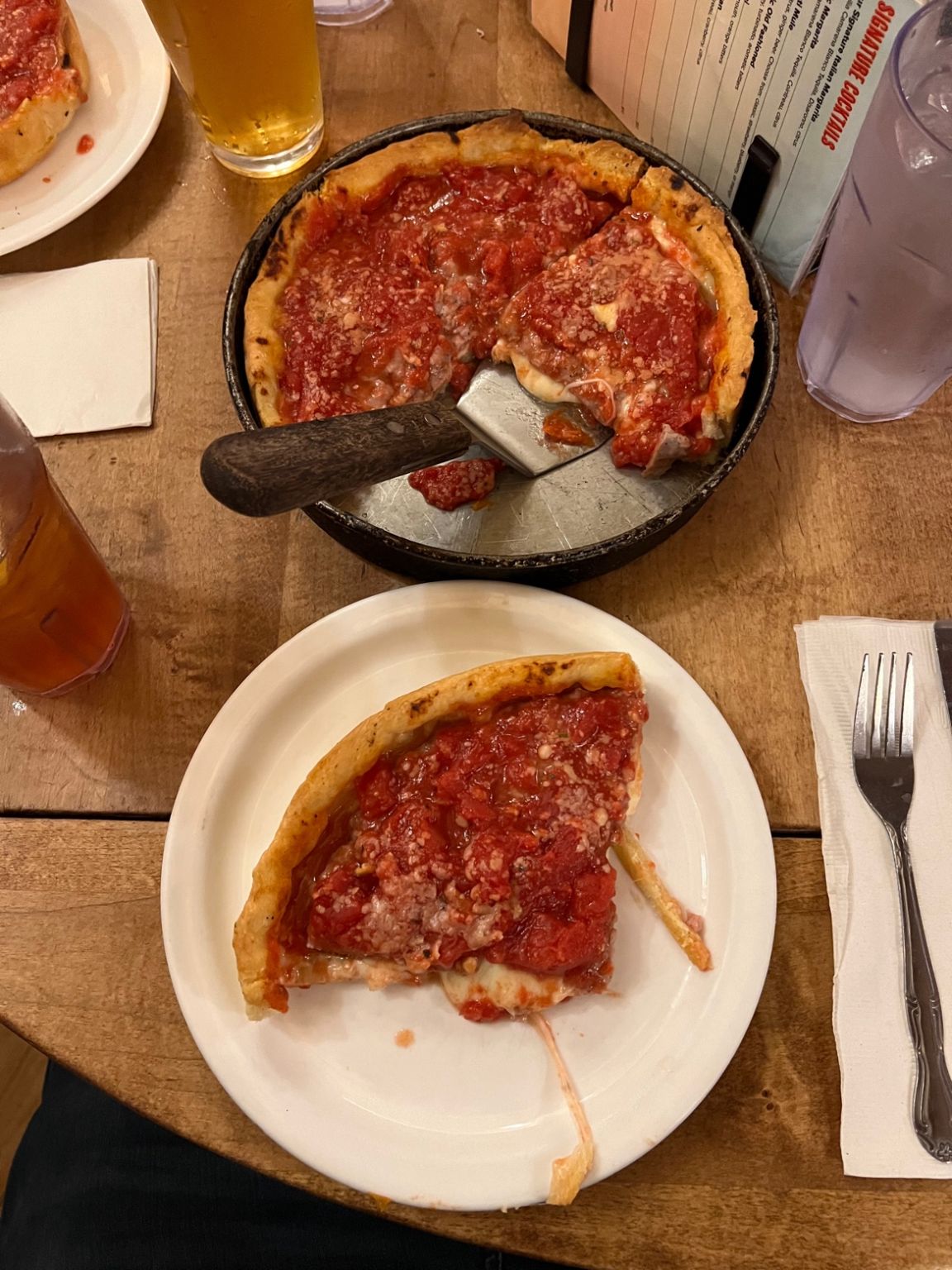
And I spent quality time with Christian Heckelmann (we live 1 hour away from each other but travel to Chicago to have dinner :D), again deep dish pizza and Keptn booth engagement.

And because Cloud-Native Rejekts was refreshing in conversations – I attended in private, without a company badge. The get-together on the weekend before KubeCon brought so many new familiar faces together. A random bunch of folks having lunch, cheering to their presentations, and leave with fond memories and laughter. A sense of community and belonging.

It's one of the reasons why I wanted to start my remote adventure in 2019 – make new friends all over the world, learn about culture, and try new flavors and tastes.
Technology growth
Last year, I really wanted to learn eBPF and dive deeper into Observability. It is a complex topic, and everyone can benefit from higher level understanding. I also wanted to see whether it fits into GitLab components to get more insights for CI/CD Observability for example. Pulled up my sleeves, and documented by learning journey in public newsletters, and new talks and an eBPF workshop at CloudLand 2023.
But then - boom. AI. LLMs. Generative AI. Inference. Hallucination. GPT. Chat. Code Suggestions. A constant stream of information.
Brain overflow.
I remember sitting in front my desk, staring at the screen, and no idea what I should learn or do next.
Then I saw a pattern with me, again. I always want to look behind the curtain, understand the technology, everything. This happened with Kubernetes before, where it took me years to take a step back, and find a use case to start learning in iterations – when someone from Heise asked if I could do a Kubernetes monitoring workshop, because I was considered a monitoring expert. I had 3 months to learn Kubernetes to do the workshop.
My manager John Coghlan helped me aligning my focus on AI and learning content creation (May 2023). In June, I decided to make myself vulnerable, and pitched an unconference session at CloudLand, turning to "AI in the DevOps lifecycle". No slides, no knowledge, just opened the lifecycle chart on the GitLab Duo website, and asked "Where are you in the DevOps lifecycle? What is the most inefficient task? What if AI could help?". This question became embedded into all my customer conversations, talks, etc. and generated a lot of product feature requests and feedback. CloudLand 2023 was fantastic, and I will come back in 2024 (spoiler: 2 sessions accepted).
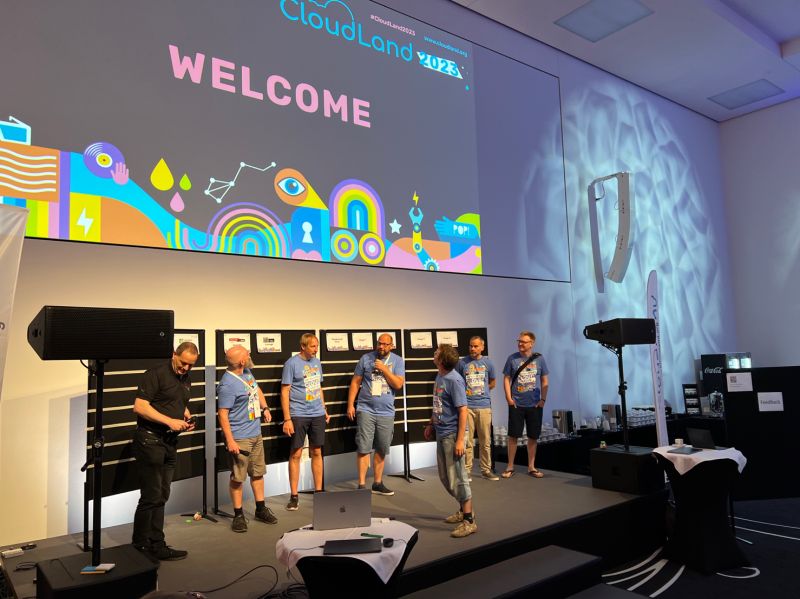
Fortunately, the transparent direction at GitLab allowed me to get a peek into AI experiments with super fast iteration by product and engineering teams. My stable counterpart activities nurtured trust and collaboration, too.
Use case for AI (yay!): Learn a programming language. So I finally learned Rust, while learning how to use AI to learn Rust, and wrote two blog posts about it, with fantastic content support by Sandra Gittlen. Inception challenge, but super rewarding.

At KubeCon NA 2023, I learned about open-source projects that run Large Language Models (LLMs) in Kubernetes. After meeting with Katie Gamanji for the first time, we walked to the solutions showcase, and found the Ollama booth. Fascinating project and team.
Since then, I use Ollama to run LLMs and try tutorials that involve writing code, and create use cases for more efficiency in the DevSecOps lifecycle. That allows me to satisfy both, work and private needs.
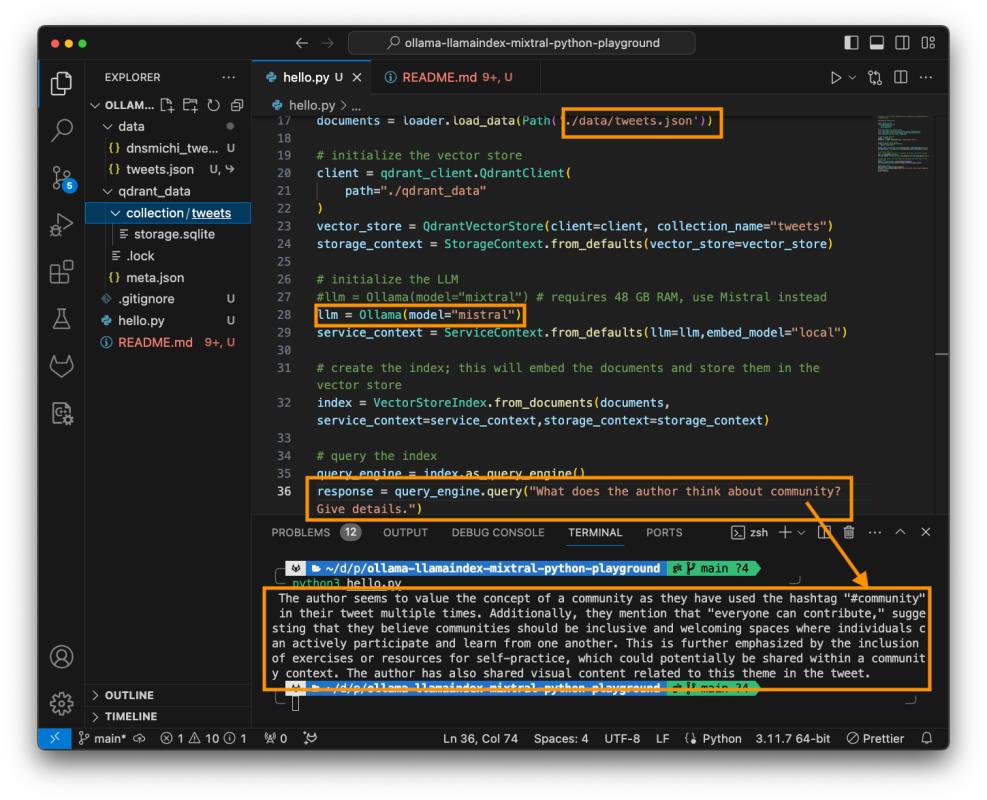
Challenge for 2024: Continue learning in public, and build my own AI.
Learning in public
My personal The Ops in Dev newsletter turned 2 years. ~400 subscribers. A monthly knowledge collection, focussed on AI, Observability, DevSecOps, Cloud-Native and including tips, bookmarks, release speedrun, events&CFPs.
No ads, the focus is on knowledge and my personal thoughts. I can afford the maintenance costs (Buttondown ~12EUR/month, domain ~20EUR/year, GitLab Pages: free). The public web archive is available on https://opsindev.news/. I also removed Google Analytics including the cookie banners in favor of a more privacy respecting solution with Umami.
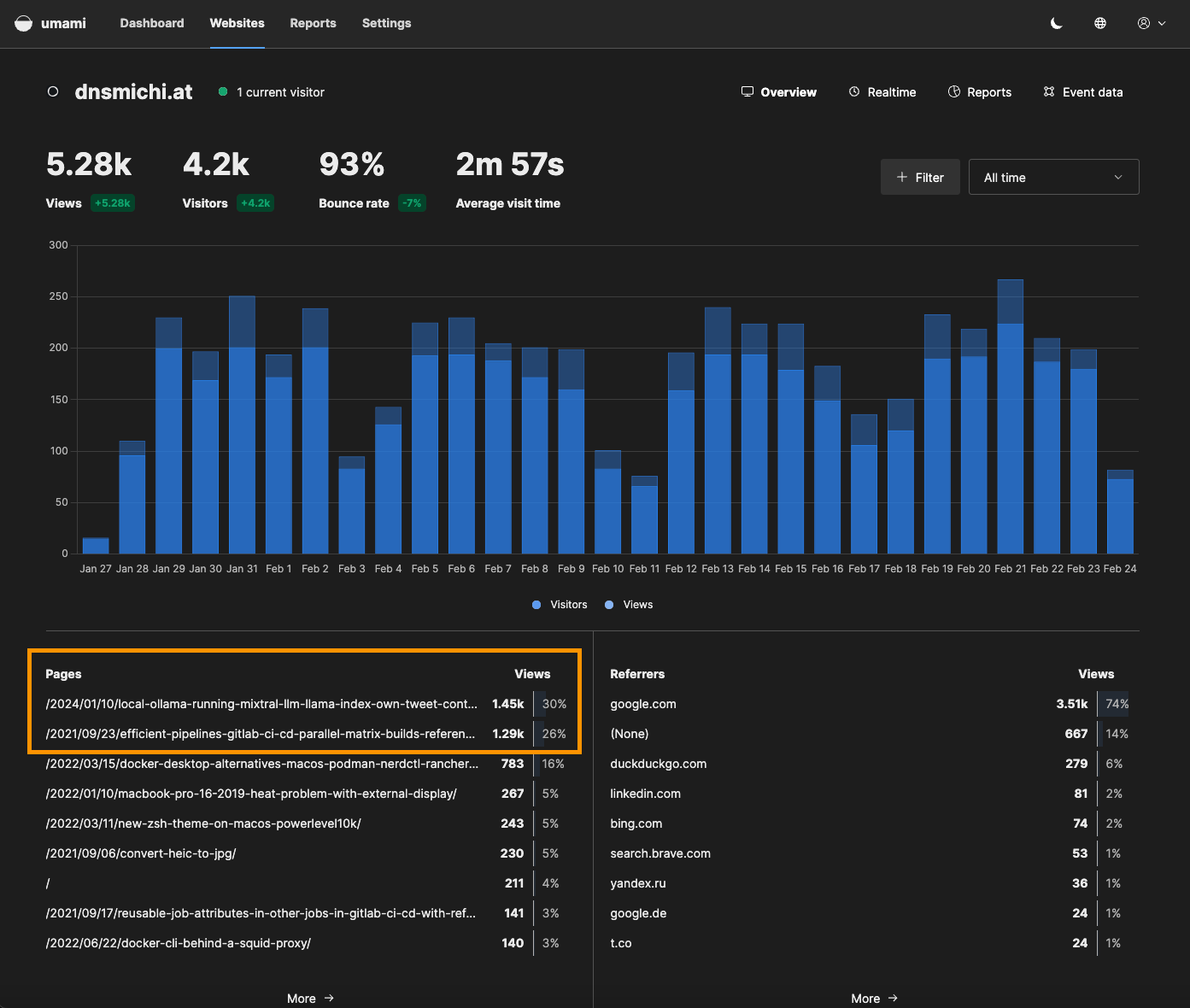
o11y.love collects many useful resources. To be honest, I use to explain eBPF to everyone because it has become my single source of truth.
Late in 2023, customers asked about practical hands-on and use cases with GitLab Duo Code Suggestions, Chat, and more AI features. In a coffee chat with Tim Zallmann, we brainstormed about trainings, team enablement, dogfooding, and showing what's possible in production workflows.
A boring solution came to life: The GitLab Duo Coffee Chat. While chatting with Michael Aigner, we thought of bias for action and recorded a session together. Testing, breaking, fixing, learning.
It became a series of different technology and storytelling, and helps team members and customers (Youtube playlist). Somehow a deja-vu from the Everyone Can Contribute Cafe meetup in 2020 :)
After repurposing the learnings into the GitLab documentation this week, planning for regular sessions already started.

Contributing to seeing others succeed
Julia Furst Morgado landed her dream job at Veeam in early 2023, and stepped up as passionate community thought leader, and keynote speaker. Inspiring to follow her growth after just one year of mentoring in 2022. And she might even be taller than Pauline ;)
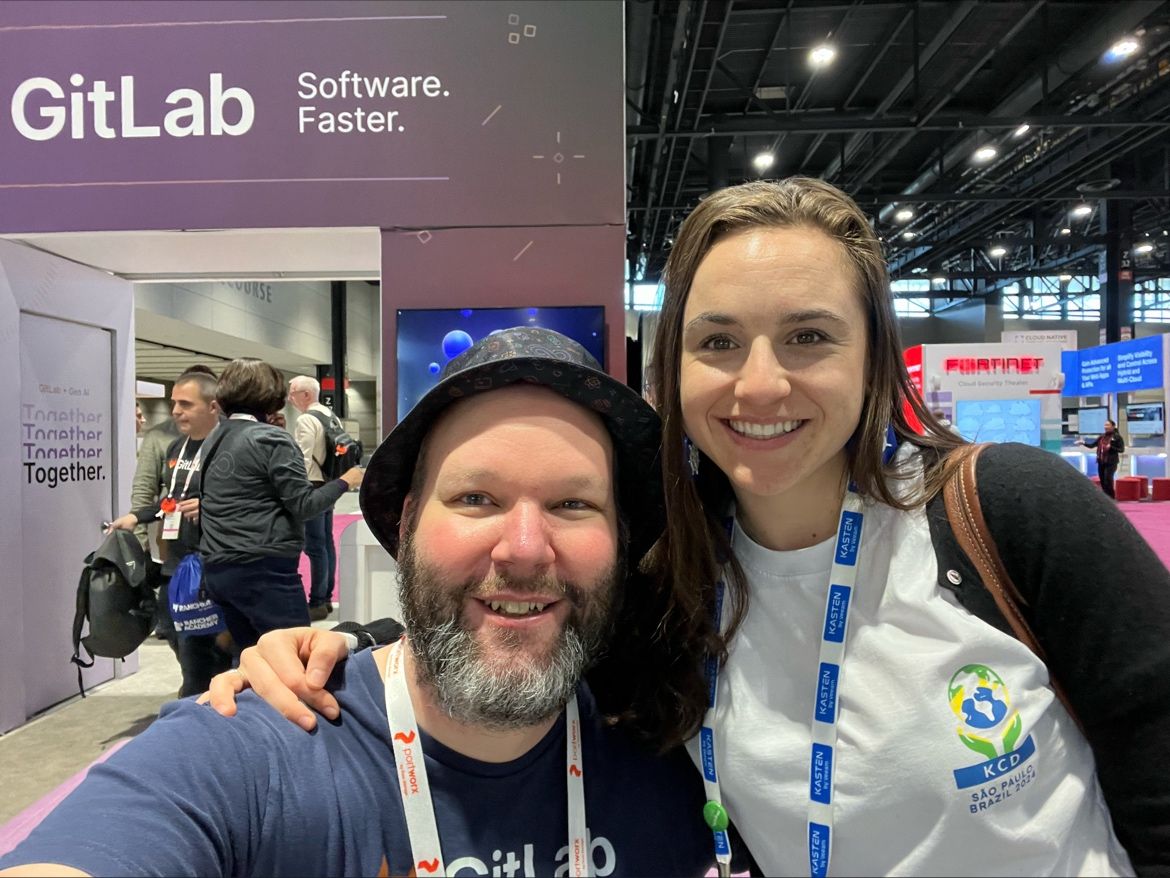
Aakansha Priya follows Julia's footsteps – learning cloud-native and DevSecOps can be challenging. We formed a learning path way, and together with Marino Wijay, she is pushing learning in public to the next level through Twitter/X spaces. Every time we meet in our monthly 1:1 calls, I'm excited to hear her results and progress, and guide with future directions and ideas.
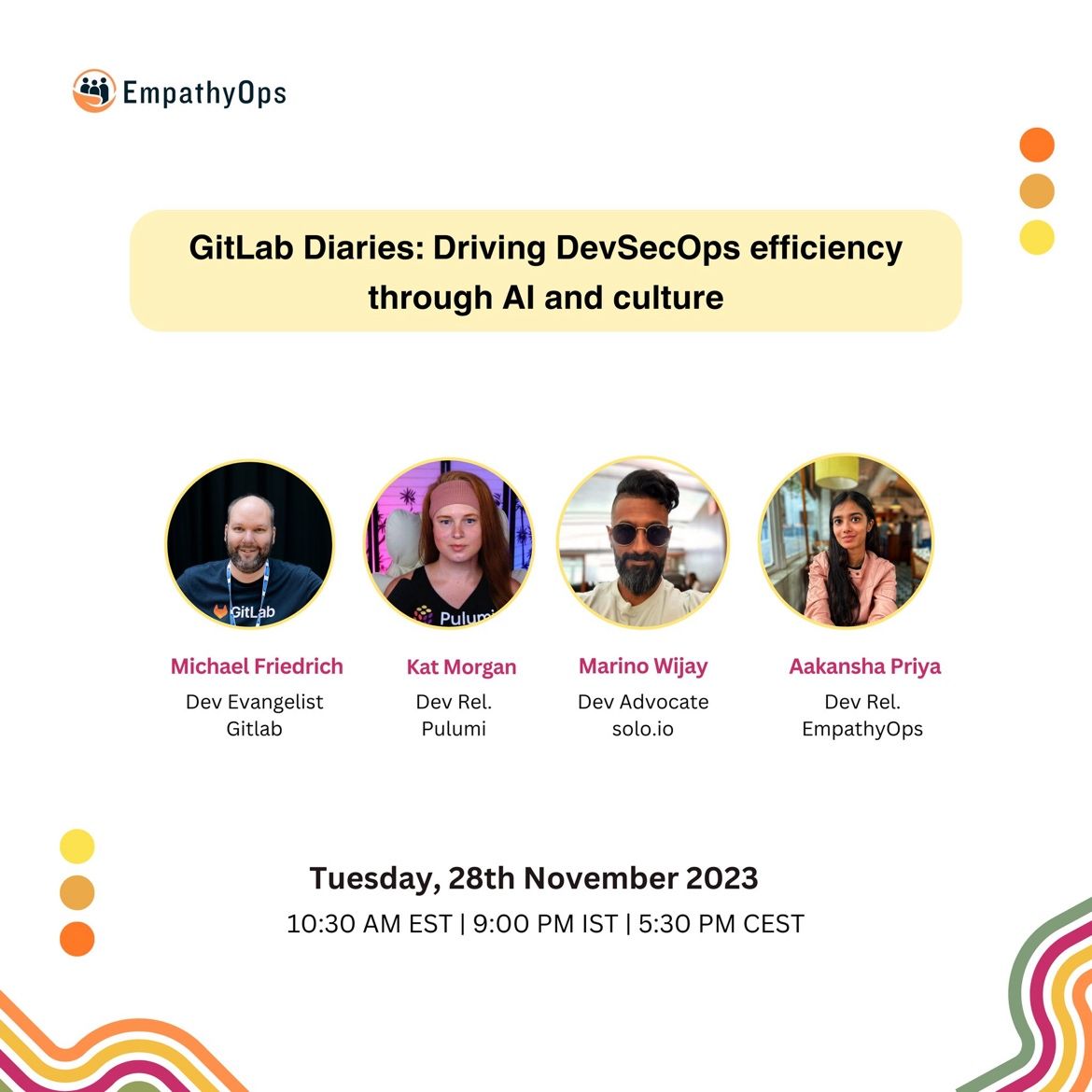
Mentoring enables me to share my wealth of experience, and makes me a better person every day 💜 I have limited my engagements, though, for the most impact, balanced with my busy work schedule.
Personal growth
In 2023, I learned to communicate updates more efficiently. For example, a project update or product insight with all details and results that takes 2 minutes to read, will be skipped over. An executive summary, highlighting the impact on the group or goals, and explaining the why, allows to iterate faster.
Developing a sense of urgency is one of my key learnings in 2023. When I post into the #ceo or #cmo Slack channel, do I need to tag Sid Sijbrandij or Ashley Kramer, or will they read the message at their own pace and take action based on the request due dates? Do I need to tag all team members in an issue comment, or who really needs to see this comment in their to-do list and mailbox notifications?
I read a lot of information on social media, community channels and GitLab issues. Sometimes, I want to share everything and escalate things immediately. But wait - is it really this urgent? Is this information useful to anyone? What needs to be explained to provide low context communication? Sometimes, the Eisenhower Matrix also applies here - do, schedule, delegate, delete. If I personally consider technology important, I fallback to my personal platforms: blog, newsletter, social media, and later repurpose into work strategy. For example, my 2024 predictions.
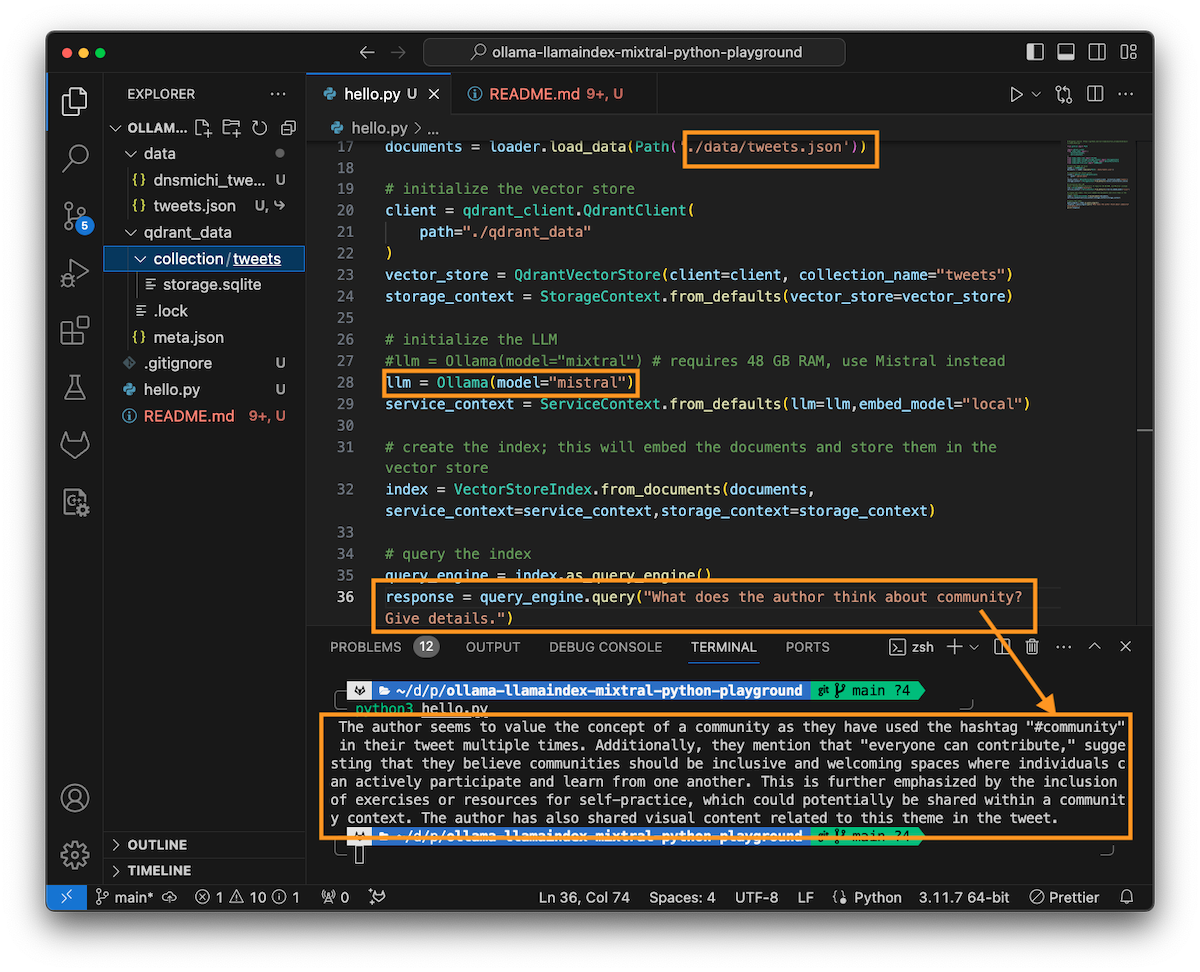
I have a backlog of 10 community Slack DMs, 20 Twitter/X DMs, 30 LinkedIn DMs and probably countless more situations where I never engaged. 2023 was too much. While I love to help and engage, my brain was dead in the evening after learning AI, and writing about how to learn AI in the second half of 2023. I even sometimes lost the desire to build LEGO models as mental brain yoga. I also put family and friends first, some situations reminded me to invest more into meaningful friendships, and put work second. Seeing a good friend smile after sending them a surprise package makes me happy <3
When I feel more refreshed and balanced, I will engage more in public communities again in 2024.
Career development
I'm experimenting with my career ladder, whether to become a people manager or continue my path as individual contributor. Somehow, I want to lead projects, decisions, strategy, teams, while still being able to drive technologies or become a project maintainer. (I'd wish I could clone myself).
I also got feedback that my activities can feel like I am managing someone, when I am not their manager. This tells me that I need to be more transparent with my career ambitions, and also work on my communication. Sometimes, I fall into old habits with negative communication patterns, and force my opinion as a path forward. Often, when I am super enthusiastic about a topic and want others follow this path for their success, instead of making a suggestion an invitation.
Reflecting on my ambitions, I updated my reading list for 2024, including these books:



Challenge for 2024: Improve communication, and be more thoughtful in collaboration. Remove the forceful context, encourage for honest and actionnable feedback through a personal README, and learn more about team psychological safety, and leadership.
Onwards to year 5
Or, like I said to John in our 1:1 this week: "Onwards to four more years. Make it ten then." And I mean that :)
2023 was definitely challenging, both with team changes and technology innovation, and the remaining bits with the private forced-out-of-flat-but-new-flat-is-so-much-better situation. I have grown a lot, but there is always room for improvements. New challenges are waiting. The GitLab Duo Coffee Chat needs to scale and inspire customers. AI is there to stay. Observability and efficiency in CI/CD are an evergreen topic, CI/CD components need my passion for adoption journeys. Develop crazy ideas and find like minded folks (waving to Darren Eastman, Sacha Guyon, Alana Belluci, Jackie Porter). Connect with team members in person (cannot wait!).
My work strategy for FY25 (2024) is public by default. Transparency so that everyone can contribute.
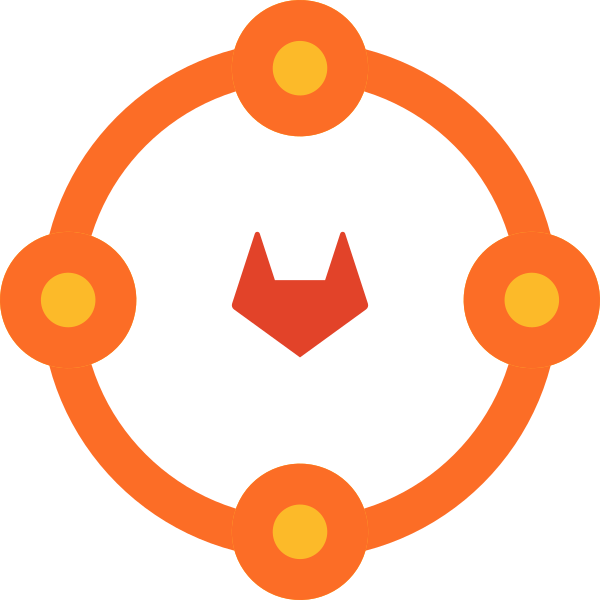
Before I round up, I want to think about my personal goals for 2024:
Career goals: Contribute to more cross-functional initiatives, and lead innovative strategy proposals to create impactful results for customers, like the GitLab Duo Coffee Chat. Learn Ruby-on-Rails, VueJS and contribute to GitLab, the code base. Get promoted to Staff Developer Advocate.
Personal goals: Explore new hiking spots, visit friends all over the world, and attend community events without work relation (Rejekts in private was so refreshing!). Build a home lab to run Kubernetes and AI workloads, and maybe build a gaming desktop for gaming.
I have started to rebuild my all-remote office with a new 49" monitor, Hue lighting, and prompter streaming improvements, and more LEGO easter eggs. More updates in a detailed blog post soon.
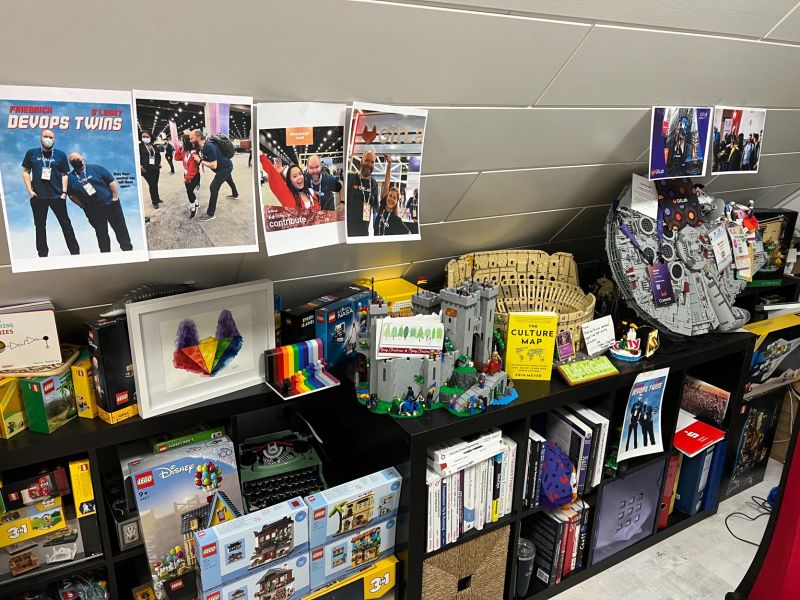
Thank you to everyone who continuously supports me on my journey. You know who you are. 💜


